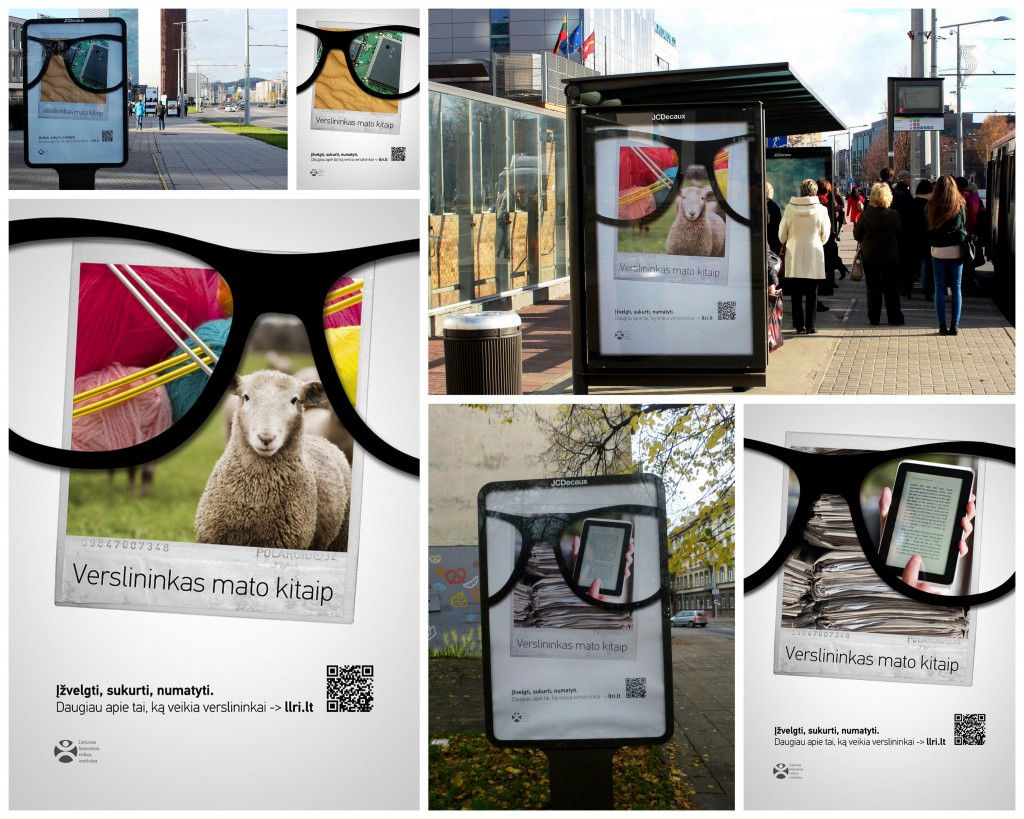 People in the streets of Lithuanian cities have recently directed their gaze towards captivating posters. Entrepreneurs see it differently, the posters say to the passers-by, inviting them to reflect on what entrepreneurs are and what they do.
People in the streets of Lithuanian cities have recently directed their gaze towards captivating posters. Entrepreneurs see it differently, the posters say to the passers-by, inviting them to reflect on what entrepreneurs are and what they do.
This campaign has been part of a major initiative of the Lithuanian Free Market Institute to champion entrepreneurship and to nurture the image of entrepreneurs in the society. “People‘s opinion about entrepreneurs is not merely an opinion. It is an enormous force that largely determines how prosperous a nation is going to be,“ Remigijus Senavaitis, the project leader, says.
Lithuanians commend entrepreneurs for hard work and risk taking, a recent survey of public perceptions of entrepreneurs conducted by LFMI shows. They also understand that businesses, not the state, are the drivers of economic well-being and job creation. Yet, mistrust of entrepreneurs is prevalent, and entrepreneurship and such attributes as ingenuity and creativity are clearly far-fetched in the minds of many. Business activity is primarily associated with the creation of jobs.
To further its cause, LFMI has published a collection of essays Public Perceptions of the Entrepreneur: What and Why? (Lith. Visuomenės požiūris į verslininką: koks ir kodėl?“). The publication features Lithuanian scholars and experts who draw on the findings of the abovementioned survey and present their insights into historical, cultural, psychological, political and economic reasons behind the existing image of entrepreneurs in the modern Lithuanian society.
The authors analyse what imprint Christian beliefs, historical eras, the Soviet legacy, the post-independent business reality and the spirit of government regulation and the rhetoric of the post-independent legislation have left on public perceptions of entrepreneurs. These perceptions reveal a great deal of ambivalence and show that Lithuanians are stuck between two extremes: they hold on to the historically embedded associations that relate business people with hard work and at the same time display suspicion towards the wealth and well-being it brings.
A rare acknowledgement or even symbolic generalization of socio-psychological attributes essential for an entreprising person is a major barrier to an adequate assessment of indepedent individual economic activity, the conclusions state. Most likely, in the mindset of the Lithuanian people there is not so much a lack of a positive image of entrepreneurs, but a lack of a favourable depiction of enterprising, resourceful and creative people. A general underestimation of an individual shapes a public opinion by which essential business incentives lie not so much in individual attributes but in conditions which form the anonymous context (government regulation and aid). When/if a society accepts the joy of the new as a principal guideline for the future and a fundamental condition for optimism, the image of the entrepreneur will be likely to flash out in the prevailing mentality, the publication concludes.
The findings of the research presented in the publication have reinforced LFMI‘s numerous comments, articles, meetings and lectures aiming to instigate a much needed shift in the minds of people that entrepreneurs do not merely create jobs and pay wages and taxes, but, first and foremost, design, adapt and materialize ideas that let us live more prosperous and more fullfilling lives.
The publication, which was made possible through a grant from John Templeton Foundation, also presents findings from public surveys carried out by LFMI partner institutions in Bulgaria, Georgia and Kyrgyzstan.